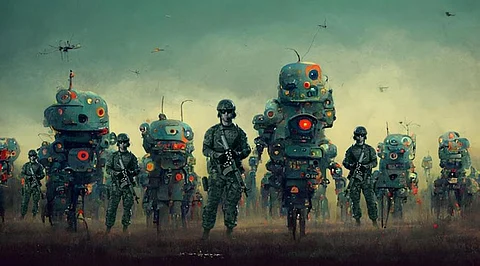

In the right hands, artificial intelligence can save lives. Soldiers receive intense training and simulations to better prepare them for battle. Systems can also decide quickly, identify potential threats, and safeguard sensitive data. The contribution of these robots to human protection is priceless and will continue to advance to new levels in the future.
Here is more information on these AI processes and how they can preserve and safeguard the lives of engineers and military personnel.
Military personnel can acquire the information and practical skills necessary to carry out their jobs safely with the proper training. Studies show that the U.S. Army and Air Force benefit from AI-assisted training, which increases retention and cuts completion times by up to 40%.
A secure passage from the barracks to the battlefield is made possible by AI software that builds virtual reality models and combat simulations. Additionally, they can practice without using actual weapons, saving money and reducing the risk of harm from an inexperienced handler.
Soldiers can practice maintaining, putting together, and using their tools and weapons with the use of simulations. It also serves as an introduction to scenarios and tactics that need rapid thinking. AI-assisted training can offer thorough preparation for all circumstances during military operations, perhaps saving lives.
Through the processing of data, AI-assisted technology can also make difficult decisions. High-stress circumstances include a war zone or active military activity. These soldiers may find it difficult to act quickly for the benefit of the group, the objective, and potential civilians.
As a result, AI algorithms can digest data quickly and forecast potential events and scenarios. The system can assess the optimal course of action for success and safety using this information.
In addition to finding patterns, decision-making processing generates performance summaries for evaluation. The military can then tweak its tactics or identify potential areas for human mistakes.
Many people would not instantly associate cyber security with saving lives, yet a military's success depends on how activities are classified and how new technology is used. While protecting these networks and data from unwanted access, artificial intelligence can also spot patterns in cyberattacks to improve strategy.
Military cyber threats are widespread around the world because of the exceptionally high level of confidentiality and the significance of this information. Governments therefore frequently emphasize the need to secure these weapons systems and plans.
All levels of authority should receive instruction from the military as well. Service lengths may differ, but cybersecurity measures get better every day. Once again, AI training algorithms make the experience more individualized by adapting the information to the user.
The majority of people undoubtedly associate AI in the military with combat and transportation. Technology for processing and monitoring can keep an eye out for threats and assess potential hazards in a zone or mission plan. Before people arrive, drones may survey the area securely to look for routes and potential campsites.
Robots like the Multi-Utility Tactical Transport (MUTT) and Modular Advanced Armed Robotic System (MAARS) serve and provide protection. MAARS is a robot and land vehicle that travels with a military squad on missions. It can locate dangers like mines, manage drones, and launch grenades.
Robots and AI are capable of healing and assisting in medical care. Alert systems can locate hurt soldiers and give medical personnel their precise location. Some robots have access to medical databases and can offer assistance and counsel to other soldiers in need.
Trauma also causes casualties to accumulate on the battlefield very quickly. In these situations, soldiers require fast intervention, and medical robots are available to help. These robots are capable of detecting anything from minor cuts and scrapes to severe burns and gashes. The security and protection of soldiers and military members around the world depend on their toolkit of knowledge.
Join our WhatsApp Channel to get the latest news, exclusives and videos on WhatsApp
_____________
Disclaimer: Analytics Insight does not provide financial advice or guidance on cryptocurrencies and stocks. Also note that the cryptocurrencies mentioned/listed on the website could potentially be scams, i.e. designed to induce you to invest financial resources that may be lost forever and not be recoverable once investments are made. This article is provided for informational purposes and does not constitute investment advice. You are responsible for conducting your own research (DYOR) before making any investments. Read more about the financial risks involved here.
